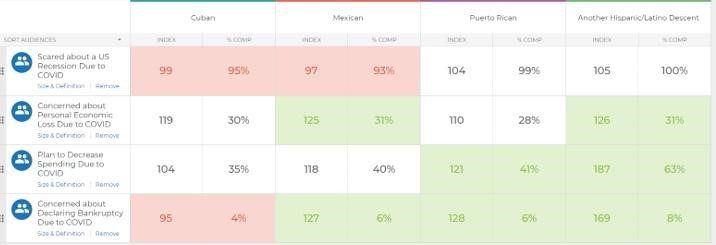 Brands have long acknowledged the importance of tailoring their messaging and marketing for multicultural audiences, but to date, many have been painting with broad strokes. Within every audience exists many segments, subsegments and even microsegments where individual values, beliefs, attitudes and preferences can vary significantly, and multicultural audiences are no exception.
Brands have long acknowledged the importance of tailoring their messaging and marketing for multicultural audiences, but to date, many have been painting with broad strokes. Within every audience exists many segments, subsegments and even microsegments where individual values, beliefs, attitudes and preferences can vary significantly, and multicultural audiences are no exception.
Is your brand connecting with multicultural audiences in a way that speaks directly to their experience? For retailers, being able to segment in a granular fashion can make or break a campaign, especially when speaking to multicultural audiences. After all, a person’s cultural experiences play a significant role in shaping nearly every facet of their being, and their values and beliefs in turn influence their spending habits, the products they buy and the offers they seek from retailers.
Let’s take a look at why it’s so important for marketers to tailor multicultural messages to ethnic microsegments in today’s marketplace.
Microsegmentation in Action Within the Hispanic Community
Microsegmentation is always important when it comes to crafting retail campaigns and communications, and we have found that to be particularly the case during the pandemic.
To illustrate the importance of nuance within today’s multicultural marketing strategies, we tapped into the Resonate Ignite consumer intelligence platform to examine the reactions and attitudes of different segments within the larger U.S. Hispanic population as it related to the COVID-19 pandemic. Of course, there are many ways to get more granular within an audience segment, but even when starting simple — breaking the larger Hispanic audience into subsegments of Cuban, Mexican, Puerto Rican and other groups of Hispanic or Latino descent — we see that striking and relevant patterns emerge.

When we examined attitudes toward businesses reopening (or remaining open) in the wake of COVID-19, we saw striking differences among Hispanic subsegments. When we looked at what we call “Reopen Rushers” — those individuals who were eager for businesses to reopen and stay open amid the pandemic — we saw that people of Mexican and other Hispanic and Latino descent over-indexed in this category, while those of Cuban and Puerto Rican descent dramatically under-indexed and were more likely to be resistant to reopening plans. For retailers, this information has a direct impact on who should receive in-store promotions versus continued reminders of curbside and delivery options.

In terms of how different Hispanic audiences responded to the financial concerns and pressures associated with COVID-19, we saw that people of Mexican and other Hispanic and Latino descent tended to be more concerned about personal economic losses due to the pandemic than those of Cuban and Puerto Rican descent. Interestingly, though, when it came to plans to decrease spending due to COVID-19, we saw that people of Puerto Rican descent and other Hispanic and Latino descent were altering their behaviors most significantly when compared with Cuban and Mexican audiences.
Similarly, concern about the possibility of having to declare bankruptcy was far lower among Cuban audiences than other Hispanic segments we examined. Again, for retailers, this information regarding financial concerns has significant implications for the types of deals and messaging that will resonate with certain microsegments.
Across the board, the above types of insights make a big difference when it comes to how retailers respond to their customers and engage with them in both turbulent and “normal” times. Approaching the Hispanic population — or really any broad cultural demographic — as a monolithic entity is a fast path to alienation of large segments of that population.
Now more than ever, brands must be able to tailor their multicultural marketing efforts through personalized offers, products, experiences and communications in order to grow. Flat, two-dimensional persona are #canceled for 2021 and beyond. Are you able to segment, plan and strategize around cultural nuances and sensitivities? Now is the time to ensure your consumer intelligence capabilities are aligned with the diverse, ever-changing reality of today’s audiences.
Ericka Podesta McCoy, CMO of consumer intelligence firm Resonate, is a global marketing executive focused on enterprise growth and revenue management in the high-tech, telecom, manufacturing, energy and hospitality sectors across North America, Europe and Asia.




